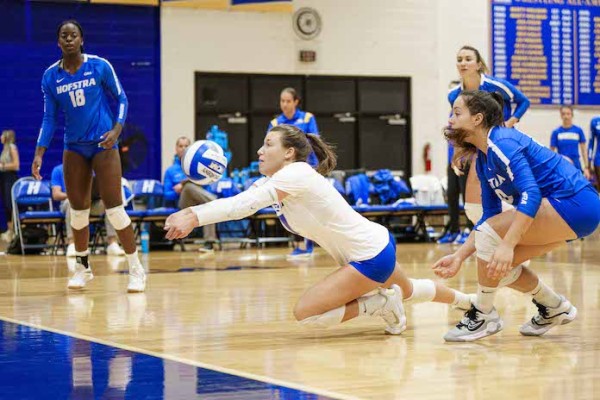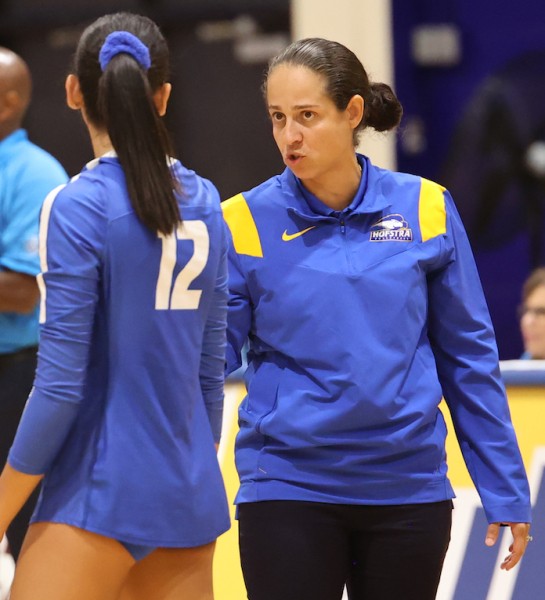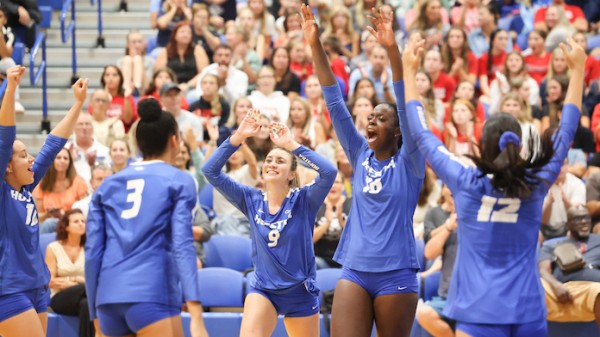International recruting continues to pay off for Hofstra, off to 7-1 start

Libero Chiara Cucco/Hofstra photo
Hofstra’s volleyball roster reads like the United Nations member list.
In addition to six American players, Hofstra’s team includes 10 players from six other countries, including four from Brazil, two from Türkiye and one each from Australia, France, Italy, and Cyprus.
According to coach Emily Mansur, the Pride’s international flavor is no accident.
“It’s been a pretty normal thing for us since I started here,” she said.
What also is pretty normal now at Hofstra is winning. The Pride are 7-1 after sweeping Sacred Heart on Tuesday. They started 6-0, lost a tough one in five against Lehigh last Saturday, and held Sacred Heart to .021 hitting while five Hofstra players had five or more kills.
Eight matches into her 10th season at the school in Hempstead, New York, Mansur boasts a 171-92 record and two NCAA Tournament berths (2014, 2018). Hofstra, which finished 17-12 overall, 14-2 in the CAA, seemed poised for another postseason run last fall. But Hofstra sustained back-to-back losses to Towson to end the regular season and then, as the second seed, was upset by seventh-seeded William & Mary in the CAA tournament.
Hofstra goes to Dartmouth this weekend and plays Stoneill on Friday and Seton Hall and the home team on Saturday. Hofstra starts conference plays with back-to-back home CAA matches September 16-17 against Elon.
Looking abroad
Содержание статьи:
Mansur, who played at Iona, another New York school, joined Hofstra as an assistant coach in 2013 after coaching at Lusófona Volleyball Club in Lisbon, Portugal. Mansur succeeded Fran Kalafer as Hofstra head coach on May 7 that year, and she had to ramp up her recruiting efforts — quickly.
Hofstra had previously included some international players. Mansur expanded that approach when she took over, mostly due to necessity.
“You need to have a longer relationship to [attract] domestic student athletes,” Mansur explained, “And when I came in from overseas, I needed quick recruits. So, that first recruiting class was super international, and it worked out. We just continued with that path.”
In her first season, Mansur led the Pride to a 28-6 record. The victories, and her recruitment of foreign-born players, have continued since then.
According to a list compiled by Volleyballmag.com, in 2022 Hofstra ranked second in the country for having the most international players on their roster (11), just behind UT Rio Grande Valley (12).
“The other universities are adapting,” she noted. “Even in the Power 5 schools, you see internationals on most rosters. Years ago, you didn’t see that.”
In the meantime, Mansur continues to follow her successful formula.

Coach Emily Mansur talks with setter Beatriz Alves/Hofstra photo
Two of Hofstra’s international recruits, juniors Beatriz Alves and Chiara Cucco, were both named to the 2023 preseason All-CAA team. Cucco, from Buscate, Italy, was the CAA’s Libero of Year in both 2021 and 2022.
Alves, who hails from São José dos Campos, Brazil, was the 2022 CAA Setter of the Year, as well as Hofstra’s student-athlete of the year from a women’s team. Alves now serves as team captain along with graduate student Sarah Pierre, a middle from Bloomfield, New Jersey.
Brazilian sophomore outside Clara Bal leads Hofstra in kills with 94 (3.24/set) and has seven aces and 14 blocks. Turkish senior outside Yagmur Cinel has 73 kills, also seven aces and 13 blocks. Brazilian freshman outside Beatriz Braga has 60 kills and 14 aces.
Alvez is averaging 9.69 assists and has team highs of 16 aces and 67 digs. Cucco has 59 digs and seven aces.
There’s also balance. In the sweep of Sacred Heart, Brazilian sophomore middle Emily Nunes got eight of her 40 kills this season and Brazilian sophomore outside Izadora Stedile got eight of her 38 to lead Hofstra.
How does Hofstra go about go about the process of identifying and recruiting players?
Mansur’s impressive international pedigree certainly helps. She was born and raised in Minas Gerais, Brazil, and left for Iona. A four-year starter, she captained the team for two years and was named to the all-conference first team in the Metro Atlantic Athletic Conference (MAAC) in 2003 and 2004. Mansur also earned the MAAC Setter of the Year Award in 2004 and was inducted into the Iona Athletics Hall of Fame in 2022.
After graduating, Mansur played professionally in Germany before returning to the U.S. and joining Marist as an assistant coach in 2006. The corporate world beckoned, however, and Mansur left America to work internationally for several years. She also played and coached overseas before returning to the States to join Hofstra.
A different recruiting process
During her time abroad and her 10 years at Hofstra, Mansur established many valuable connections with foreign coaches and programs. Those relationships help her to discover and recruit new talent.
“I have been very blessed to develop a lot of great relationships with coaches that I trust,” Mansur said. “They know that it will take a specific type of student-athlete to be happy here, and they understand the right fit to send us.”
Once Mansur receives a recommendation, she watches video. Next, she said, “I try to go to their country and see them live, because it’s very different watching videos [rather than] seeing them in person.”
In some cases, however, Mansur can’t schedule a visit, so she’ll rely on player videos plus their coach’s recommendation. That was the case with Brazilian freshman Beatriz Braga, whom Mansur recruited despite not seeing her play in person .
“I didn’t get to see her live,” explained Mansur, “But I have had three other players from the same [coach], so I [have confidence] that he knows what fits our program, and I could trust him.” However, Mansur continued, “I do try to go and see them. I’m always a little bit nervous if I don’t see these student-athletes.”
Players are drawn to America and New York
When she pursues players from abroad, Mansur sells Hofstra’s proximity to New York City as a main attraction. Hofstra’s campus lies only 30 miles from the Big Apple. “
“It’s a huge help,” she said.
Mansur also promotes the academic and professional benefits of Hofstra’s program. She said that all her graduates “leave here with a professional contract to play, or with a job. We don’t have one athlete who left here without knowing what was next. And this helps, especially with the internationals.”
Mansur knows that living abroad presents academic as well as emotional challenges, and she uses her own experiences to help her international student athletes make the transition. They may feel isolated and alone, she said, and “because I’m international, you know, [it helps make] a comfortable situation for them. It’s just really the chance to come to New York and attend a great school .”
Diversity’s an advantage
Does having so many foreign-born players on the roster raise red flags for American recruits?
“Not really,” said Mansur. “We ask them, ‘Hey, how would you feel about coming to such a diverse environment?’ And they are attracted to that, so it works. They come in super excited. If it’s someone that doesn’t want to get out of their comfort zone, this is just not the place.”
All coaches know it’s hard enough getting a team to mesh, given different players’ personalities and backgrounds. How does Mansur manage her unique situation, with so many nationalities added to the mix? Especially when none of her players knew each other beforehand, even those who came from the same country.
“Yes, this is something that we talk a lot about with [the players]. How it’s so important for us to try to play our Hofstra system. Everyone brings something that we learn from, and maybe we can use that next year, but when they first get here, we need to play the Hofstra way. So, it really is them buying in and trying to do what works for us.”
Mansur’s previous teams “taught us that it’s a good mixture between American and international kids.”
What about language barriers? Do those present any issues?
“We have a rule in our program,” said Mansur. “It doesn’t matter how many players are from your country. You are only allowed to speak English. We are very strict with that.”
Mansur believes that it’s important to make sure that all of her players communicate in English to build unity on the team. Her foreign players “have to pass a Hofstra English test,” she said, “But they may be great writers and readers, but not necessarily speakers.”
Mansur said that her players speak English to each other even if they are from the same country.
“They know it’s for their own benefit. They’re going to get better this way.”
As a result, Mansur said she sees huge improvement in her players’ language skills as they move from their first semester to their second.
All about opportunity
For Mansur, recruiting and coaching volleyball means much more than simply winning matches and championships. It’s a chance to teach her players about opportunities they may never have imagined for themselves, especially for those born outside the U.S.
Opportunities like Mansur encountered in her own life.
“I’m from Brazil,” Mansur said. “I started playing volleyball when I was 9. I never thought it was possible to be a coach because, in Brazil, I was never coached by a woman. I never saw a woman coaching. And then, I started coaching club when I was in college, and I saw that, ‘My God. I’m a woman, and I can coach.’ ”
Even when she left America for a business career abroad, Mansur never gave up her coaching dream.
“I always coached club, I never stopped. I just absolutely love coaching,” she said. She knew she still wanted to live in America, Mansur added, “So I decided to come back home.”
Why was that?
“It is the United States,” said Mansur. “It’s the opportunity that we can make anything happen, and [especially] for a woman. Just to live in New York and know that I can do anything, because that’s what we all think is America. You can build your dream if you work for it.”

The Pride celebrate a point this season/Hofstra photo
Source